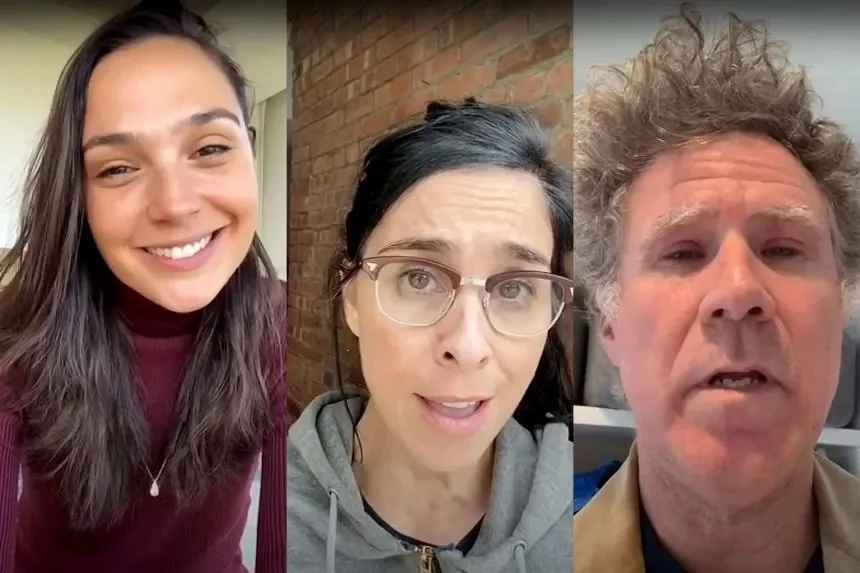Has the pandemic changed how we view celebrities?
COVID-19 has highlighted how differently celebrities live from most of the public as they access a world we have missed
(From left) Gal Gadot, Sarah Silverman, and Will Ferrell singing John Lennon’s Imagine (photo: YouTube)
A few days ago marked one year since Gal Gadot, six days into precautionary COVID-19 self-isolation, created a star-studded video montage covering John Lennon’s “Imagine”—a moment that a recent article headline for The Telegraph said, “… ruined celebrities for good.”
As the COVID-19 pandemic has endured over the past year, killing millions of people worldwide and forcing many further into poverty or to drastically change their lifestyles, the privilege of celebrities and influencers has been caught in 4K while they do their best to maintain how “relatable” they are.
The clearest example of this is Kim Kardashian’s Twitter thread from October 27, 2020, about celebrating her 40th birthday “with family and friends in a safe environment”—otherwise known as a private island in Tahiti.
“There is not a single day that I take for granted,” Kardashian tweeted, “especially during these times when we are all reminded of the things that truly matter” (emphasis my own).
People who have had to navigate the complicated world of scheduling COVID tests only to see their grandparents from a distance read along as Kardashian tweeted about her “closest inner circle” undergoing “2 weeks of multiple health screens” so they could take a “trip to a private island where [they] could pretend things were normal just for a brief moment in time.”
Their normal included dancing, riding bikes, swimming near whales, kayaking, watching a movie on the beach, “and so much more.” Kardashian acknowledged that “for most people, this is something that is so far out of reach right now.” It served as a reminder of “how [privileged] her life is.”
A reminder of privilege for the wealthy is a stark reminder of the disparities in access, equity, and care for so many others and how those disparities have widened during a global pandemic. However, this class gap has also increased our fascination with celebrities in the pandemic.
At a time when more people are staying home, unable to see friends or go to their favorite spots as easily, spending more time scrolling timelines and news feeds, celebrities and influencers, who have unfathomable access to the world around them, have become our portal to “normalcy”—while embodying lifestyles that transcend normal.
They are going on vacations, visiting clubs, collaborating on creative projects with new acquaintances, and seemingly fearlessly making memories with friends and family.
As I think about how my partner and I have sequestered ourselves at home since this time last year—really only leaving to see my partner’s mom or do curbside pickup at stores or restaurants—I am not surprised that we have obsessively watched reality television during this time.
Over the course of the past year, we have watched Real Housewives of New York City and Potomac all the way through, rewatched the first few seasons of The Hills, and have made a weekly occasion of cracking open a few Loverboy spritzes while watching our television best friends on Summer House.
The cast of Summer House season 5 (photo: Bravo TV)
During every episode, my partner and I regularly turn to each other and say, “Ugh, I would kill to be doing that right now.”
And the reality is, yes, we could kill doing those things right now.
But will there be an end to celebrity culture as we know it? Did Gadot’s “Imagine” cover really ruin celebrities for good?
More importantly, how do we bring a future into the present where everyone has what they need — a world people do not feel the need to escape from?
Maybe more out of reach than a trip to a private island is a restructured society. But I hope we all have the space to conceive of this possibility at least for a brief moment in time.

